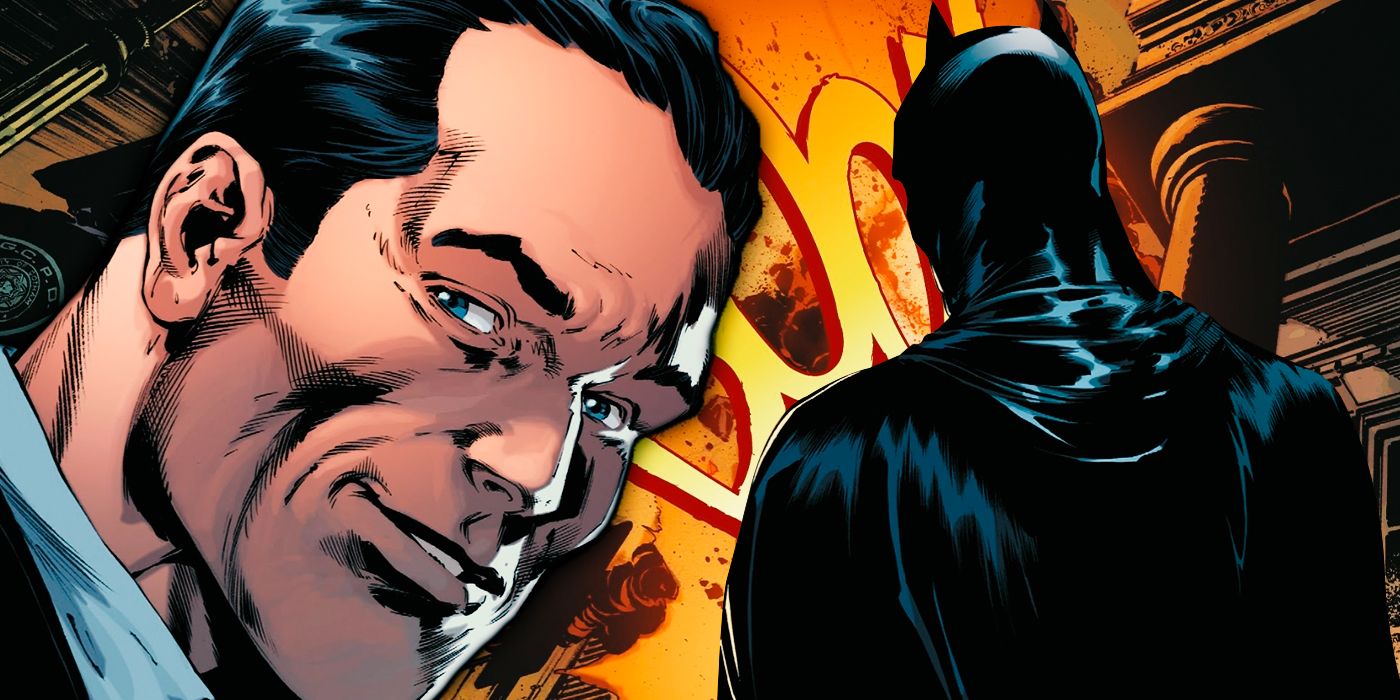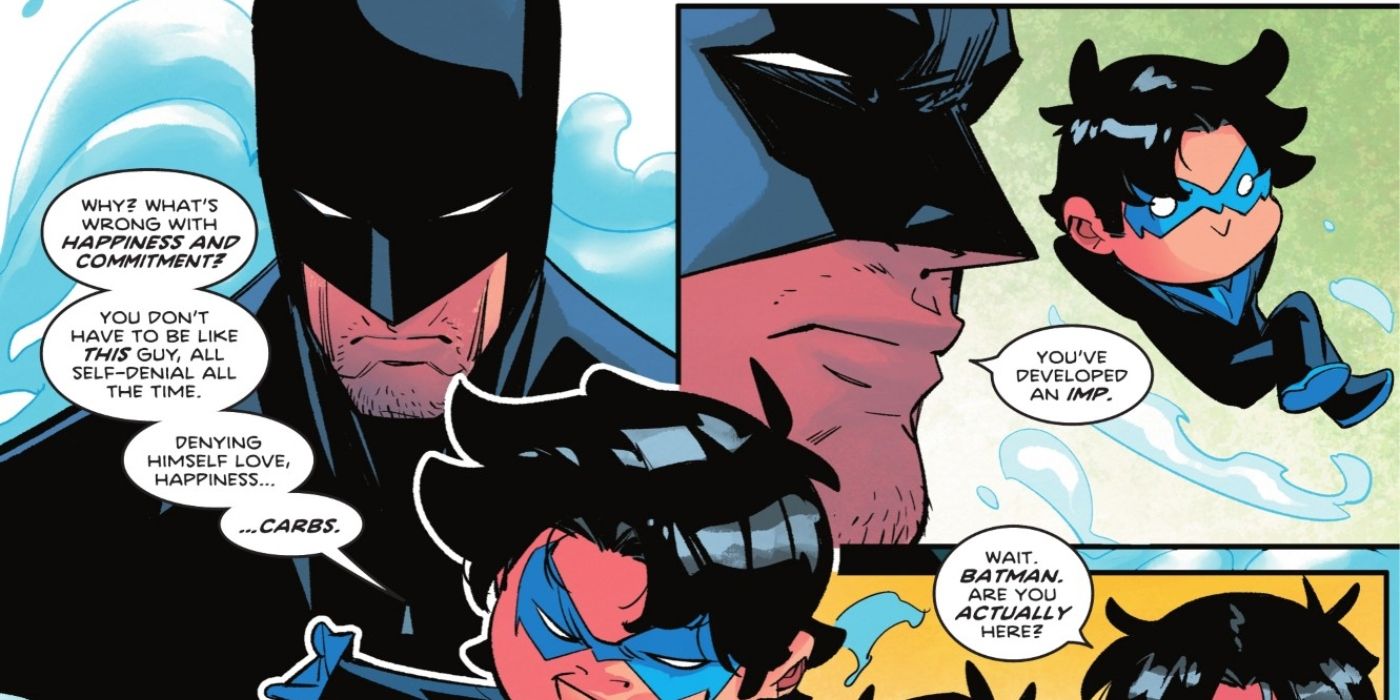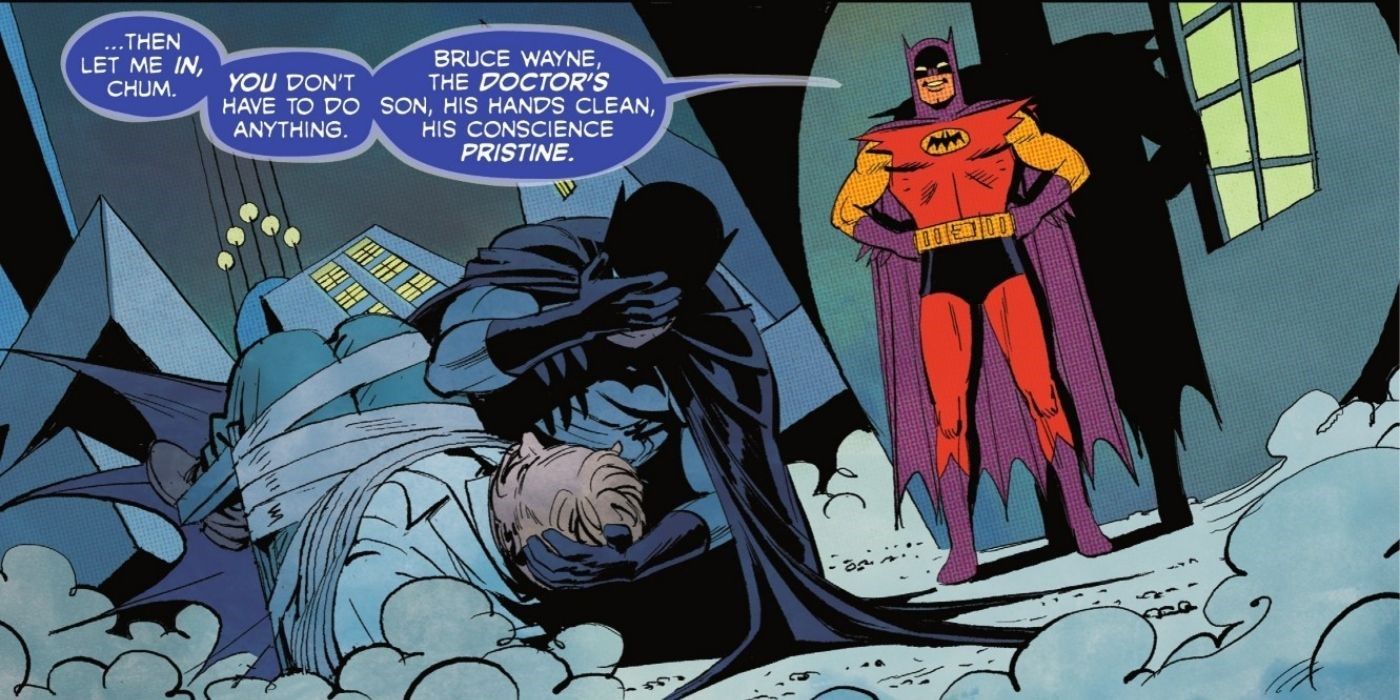The following article contains spoilers from Nightwing #98 and Dark Crisis: Worlds Without a Justice League - Batman #1, on sale now.
Batman's psychology has been a subject that fans, writers, and even psychologists have gone over extensively. Watching him struggle to determine which side of himself, Batman or Bruce Wayne, was the true personality at the core of his being has always been a major part of his story. However, recent issues featuring The Dark Knight, have not only suggested that Batman is the true personality, but also that he actively tries to suppress anything that would strengthen the part of him that is Bruce Wayne.
Nightwing #98 (by Tom Taylor, Daniele Di Nicuolo, Adriano Lucas, and Wes Abbott) had a moment where Nite-Mite, Nightwing's own fifth-dimensional imp, conjured up the real Batman to use him as a cautionary tale. He stated that Batman denies himself any sort of happiness, from love to family to even carbs. While a humorous moment, it may have unintentionally struck the heart of the Batman/Bruce Wayne dynamic. What if it isn't that Batman isn't denying himself happiness, but denying anything that would strengthen the Bruce Wayne part of himself? In essence, Batman refuses to be happy because he thinks it would weaken him.
Batman Sees Bruce Wayne As a Weakness
Proof of this can be found in the backup story "I Am a Gun - Part Two" from Batman #129 (by Chip Zdarsky, Leonardo Romero, Jordie Bellaire, and VC's Clayton Cowles). It details a time from earlier in Batman's career when he created a backup personality to take over in the event his mind was compromised: the Batman of Zur-en-Arrh. What separates the two is that Zur is Batman devoid of Bruce Wayne's influence. Compassion, empathy, and the morals his parents taught him were outright stripped away from this "pure Batman" to create the ultimate vigilante.
This reveals that Batman believes, should his mind be compromised, the only thing strong enough to resist whatever could control or break him would be a Batman without Bruce Wayne. A Batman without the weakness. If he can find a way to separate Bruce from Batman, then his efficiency as a vigilante would skyrocket, as there would be no need to concern himself with the limitations Bruce places on him. There would also be no other business or personal attachments demanding his attention beyond protecting Gotham City.
This theory is furthered by Dark Crisis: Worlds Without a Justice League - Batman #1 (by Simon Spurrier, Ryan Sook, and Troy Peteri) where Bruce Wayne literally split himself in two, so he could live out both lives. He lives one as a vigilante, and the other as the architect of the last safe place on Earth. It was a way to lead both lives and explore what kind of happiness those paths would bring him, and while it wasn't the most stable solution, both men were ultimately content. The fact that this is his ideal world proves that he believes he would function best as two separate individuals.
The Tragedy of Batman's Denial of Self
What makes this so heartbreaking is that Batman is desperately trying to deny the existence of an integral part of himself. He views Bruce Wayne as weak because Bruce cares, but this flies in the face of everything Batman stands for. More to the point, Batman only exists because Bruce cares so much. He may not be the hardened vigilante, but without that night of trauma Batman would not have been born, nor would he remember why he swore to fight criminals. It wasn't to punish the world for what had happened to him, it was to ensure no one would ever suffer the way he has. Empathy for others is the foundation of Batman's entire existence.
Yet, Batman continues to go out of his way to deny Bruce Wayne's happiness at any opportunity. He chose to not marry Catwoman, he deliberately puts distance between himself and his loved ones, and he even apparently refuses to eat carbs. All of it indicates that this might not just be a form of self-denial, but self-hate. Batman would only go out of his way to refuse himself any kind of joy if he believed he didn't deserve it. Perhaps it's a manifestation of survivor's guilt. Bruce Wayne was too weak to save his parents from being killed in an ally, but Batman could have, so Batman must take the reins.
This, of course, is a tragedy, as it essentially blames a child for failing to stop something that was beyond his ability to control. Batman's failure to recognize this has not only cost him many opportunities to find his own form of peace but has also negatively impacted those closest to him. He holds himself to an impossible standard, and when he inevitably falls short he takes it out on himself.



